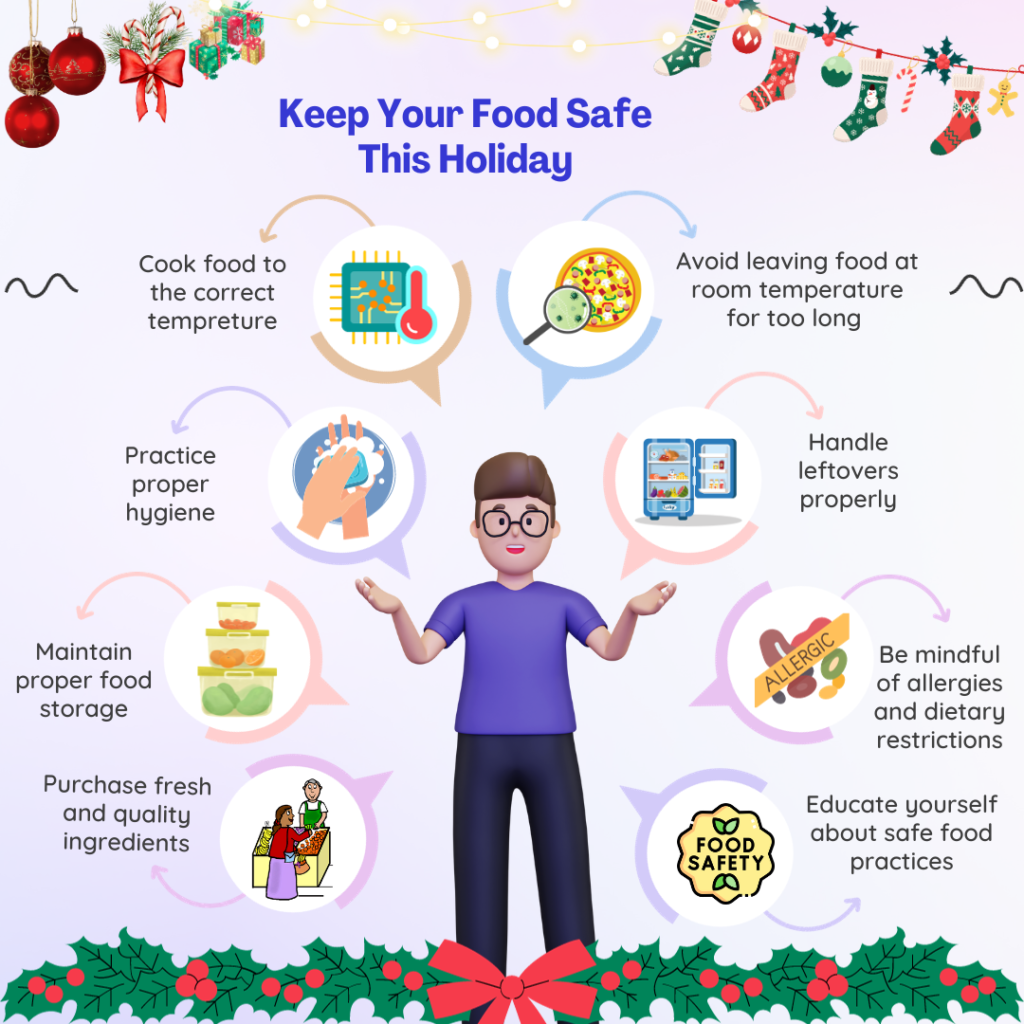ENSURING FOOD SAFETY
Essential Tips for the Christmas Festive Season

As the Christmas festival season approaches, it is essential to prioritize food safety to safeguard the health and well-being of your loved ones. With a few simple precautions, you can ensure a delicious and risk-free culinary experience. Here are some food safety tips to keep in mind:
1. Purchase Fresh and Quality Ingredients: Kick off your festive preparations by carefully selecting fresh and high-quality ingredients. Whether it’s fruits, vegetables, meat, or dairy products, always check for signs of spoilage and expiry dates. Opting for fresh produce will not only enhance the taste of your dishes but also minimize the risk of foodborne illnesses.
2. Maintain Proper Food Storage: Proper food storage plays a vital role in preserving the freshness and safety of your ingredients. Perishable items, such as meats and dairy products, should be stored at the recommended temperature in your refrigerator to deter bacterial growth. To prevent cross-contamination, separate raw and cooked foods, using separate containers or wrapping.
3. Practice Proper Hygiene: Maintaining good personal hygiene is crucial when handling food. Cleanse your hands thoroughly with soap and water before cooking or handling any ingredients. Additionally, ensure a clean cooking environment by regularly sanitizing countertops, utensils, and cutting boards. By prioritizing personal hygiene, you reduce the risk of contaminating your dishes.
4. Cook Food to the Correct Temperature: When it comes to meat, poultry, seafood, and other potentially hazardous foods, ensure they are cooked to the appropriate internal temperature. Using a food thermometer, confirm that they reach the recommended temperatures, as this destroys harmful bacteria that can cause foodborne illnesses. Stay knowledgeable about the proper cook times and temperatures to ensure your dishes are delicious and safe.
5. Avoid Room Temperature Storage: Bacteria thrive in the “danger zone” between 40°F and 140°F (4°C and 60°C), so it’s essential to avoid leaving food at room temperature for extended periods. Keep hot foods hot and cold foods cold to inhibit bacterial growth. Timely serving and refrigeration can significantly reduce the risk of foodborne illnesses during the festive season.
6. Handle Leftovers Properly: After the feast ends, handling leftovers correctly is crucial. Refrigerate any remaining food within two hours after cooking. If you have large quantities of leftovers, consider freezing them for another day. Consume leftovers within a few days or follow recommended freezing guidelines for extended storage. Properly storing leftovers avoids contamination and maintains food safety.
7. Consider Allergies and Dietary Restrictions: When hosting guests, it’s essential to inquire about any food allergies or dietary restrictions they may have. By being mindful of these needs, you can prevent any unfortunate incidents and offer suitable alternative options. Ensuring everyone’s dietary safety fosters a warm and inclusive Christmas experience for all.
8. Educate Yourself About Safe Food Handling Practices: Staying informed about current food safety guidelines and regulations helps you make well-informed decisions in the kitchen. Regularly educate yourself about safe food handling practices to not only protect yourself and your loved ones but also ensure that your delicious Christmas dishes are safe for consumption.
By implementing these food safety practices, you can enjoy a festive season filled with delicious delights and the joy of knowing you have taken proper precautions to safeguard your loved ones’ health. Embrace these tips and create unforgettable memories this Christmas!
